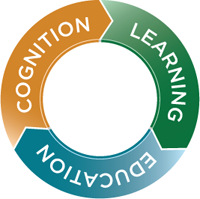
Title
Chapter 12: The Benefits of Cross-Talk: Cognitive Psychologists and STEM Educators from Multiple Disciplines Can Enrich Their Research and Enhance STEM Education Through Shared Knowledge
Editors
Mark A. McDaniel, Regina F. Frey, Susan M. Fitzpatrick, & Henry L. Roediger III
Files
Description
The inaugural 2012 CIRCLE conference and this accompanying book come at an important time when there are many national calls to transforming STEM education. The 2012 report from President’s Council of Advisors on Science and Technology [(PCAST, 2012)] and numerous other reports [(e.g., National Research Council, 2012; [Brewer & Smith, 2011; National Science Board, 1996)] have issued a variety of recommendations that emphasize several key proposals including the following: implementing empirically-validated teaching methods, engaging students actively in their own learning, exposing students to research thinking and problem solving, and providing students with opportunities to engage in research and hands-on activities and to study real-world problems. These various types of active exposure lead to the development of key process (or professional) skills such as information processing, problem solving, and critical and analytical thinking [(Michaelsen et al., 2002; Prince, 2004)] that are needed for success in the workplace. These experiences also affect persistence of students in STEM majors; some studies show that such exposure can reduce or eliminate the achievement gap between majority and minority students [(Haak et al., 2011; Rath et al., 2007).] Hence, using evidence-based active-learning teaching practices in multiple STEM courses could result in diversifying STEM majors, in increasing retention of students in STEM majors, and in increasing the likelihood more students will consider STEM careers after graduation.
Document Type
Chapter
ISBN
978-1-941823-00-2 (MOBI), 978-1-941823-01-9 (ePub), 978-1-941823-02-6 (PDF)
Publication Date
9-10-2014
Publisher
Washington University Libraries
City
Saint Louis
Disciplines
Cognitive Neuroscience | Cognitive Psychology | Educational Psychology | Engineering Education | Higher Education | Higher Education and Teaching | Science and Mathematics Education | Teacher Education and Professional Development
Recommended Citation
Frey, R.F. & Fitzpatrick, S.M. (2014). The benefits of cross-talk: Cognitive psychologists and STEM educators from multiple disciplines can enrich their research and enhance STEM education through shared knowledge. In M. McDaniel, R. Frey, S. Fitzpatrick, & H.L. Roediger (Eds), Integrating cognitive science with innovative teaching in STEM disciplines [E-reader version] (pp. xxx-xxx). doi: http://dx.doi.org/10.7936/K7BG2KWM




Comments
Chapter 12, Integrating Cognitive Science with Innovative Teaching in STEM Disciplines. Chapter DOI: http://dx.doi.org/10.7936/K7TD9V7Q. Link to complete book available at: http://openscholarship.wustl.edu/books/9/
Complete book available for purchase through Amazon and Apple. For information about alternative versions, please contact digital@wumail.wustl.edu. Arranged for publication, sale, and distribution in electronic and print form by Washington University Libraries. All articles Copyright © 2014 by the individual authors.